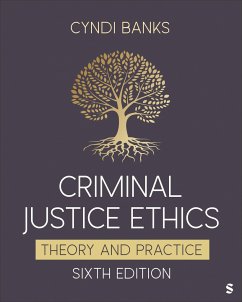- Broschiertes Buch
- Merkliste
- Auf die Merkliste
- Bewerten Bewerten
- Teilen
- Produkt teilen
- Produkterinnerung
- Produkterinnerung
Criminal Justice Ethics, Sixth Edition examines the criminal justice system through an ethical lens by identifying ethical issues in practice and theory, exploring ethical dilemmas, and offering suggestions for resolving ethical issues and dilemmas faced by criminal justice professionals
Andere Kunden interessierten sich auch für
![Effective Communication in Criminal Justice Effective Communication in Criminal Justice]() Robert Grubb (Skip) E.Effective Communication in Criminal Justice80,99 €
Robert Grubb (Skip) E.Effective Communication in Criminal Justice80,99 €![Perspectives on Deviance and Social Control Perspectives on Deviance and Social Control]() Michelle L. Inderbitzin (USA Oregon State University)Perspectives on Deviance and Social Control86,99 €
Michelle L. Inderbitzin (USA Oregon State University)Perspectives on Deviance and Social Control86,99 €![Correctional Counseling, Treatment, and Rehabilitation Correctional Counseling, Treatment, and Rehabilitation]() Robert D. Hanser (University of Louisiana at Monroe)Correctional Counseling, Treatment, and Rehabilitation147,99 €
Robert D. Hanser (University of Louisiana at Monroe)Correctional Counseling, Treatment, and Rehabilitation147,99 €![Aim for the Heart Aim for the Heart]() Al TompkinsAim for the Heart110,99 €
Al TompkinsAim for the Heart110,99 €![Confirmatory Factor Analysis Confirmatory Factor Analysis]() J. Micah Roos (Virginia Polytechnic Institute and State UniversityConfirmatory Factor Analysis53,99 €
J. Micah Roos (Virginia Polytechnic Institute and State UniversityConfirmatory Factor Analysis53,99 €![Infants, Children, and Adolescents - International Student Edition Infants, Children, and Adolescents - International Student Edition]() Laura E. BerkInfants, Children, and Adolescents - International Student Edition199,99 €
Laura E. BerkInfants, Children, and Adolescents - International Student Edition199,99 €![Analyzing and Interpreting Qualitative Research Analyzing and Interpreting Qualitative Research]() Analyzing and Interpreting Qualitative Research110,99 €
Analyzing and Interpreting Qualitative Research110,99 €-
-
-
Criminal Justice Ethics, Sixth Edition examines the criminal justice system through an ethical lens by identifying ethical issues in practice and theory, exploring ethical dilemmas, and offering suggestions for resolving ethical issues and dilemmas faced by criminal justice professionals
Produktdetails
- Produktdetails
- Verlag: SAGE Publications Inc
- 6 Revised edition
- Seitenzahl: 672
- Erscheinungstermin: 10. September 2024
- Englisch
- Abmessung: 204mm x 255mm x 42mm
- Gewicht: 1232g
- ISBN-13: 9781071875384
- ISBN-10: 1071875388
- Artikelnr.: 69925291
- Herstellerkennzeichnung
- Libri GmbH
- Europaallee 1
- 36244 Bad Hersfeld
- gpsr@libri.de
- Verlag: SAGE Publications Inc
- 6 Revised edition
- Seitenzahl: 672
- Erscheinungstermin: 10. September 2024
- Englisch
- Abmessung: 204mm x 255mm x 42mm
- Gewicht: 1232g
- ISBN-13: 9781071875384
- ISBN-10: 1071875388
- Artikelnr.: 69925291
- Herstellerkennzeichnung
- Libri GmbH
- Europaallee 1
- 36244 Bad Hersfeld
- gpsr@libri.de
Cyndi Banks is Associate Vice President of Student Success at Capilano University in Canada. She spent 16 years as a professor of criminology and criminal justice and Dean of University College at Northern Arizona University. She has more than 24 years' experience of research and project implementation in developing countries in the fields of juvenile justice, probation, justice policy, and child rights. She has worked as a criminologist in Papua New Guinea, Bangladesh, Iraq, Kurdistan, Timor Leste, Sudan, and Myanmar. She is the author of numerous articles and books, including Criminal Justice Ethics; Youth, Crime and Justice; Developing Cultural Criminology: Theory and Practice in Papua New Guinea; Alaska Native Juveniles in Detention; Comparative, International, and Global Justice: Perspectives From Criminology and Criminal Justice; and most recently, Prisons in the United States.
Preface
Acknowledgments
About the Author
Part I: The Interaction Between Ethics and The Criminal Justice System
Chapter 1: The Importance of Ethics in Criminal Justice
The Meaning of Ethics
The Value of Ethics
Normative Ethics
Ethical Relativism
Cultural Relativism
Ethical Absolutism
Ethical Pluralism
Religion and Ethical Standards
Ethics and Natural Law
Ethics and Law
Ethical Dilemmas
Ethical Issues in Criminal Justice
Chapter 2: Police Ethics: The Nature of Policing and Police Corruption
Ethics and Policing
The Nature of Policing
Police as an Institution
Police Culture
Police Discretion
Ethics and Codes of Ethics
Policing and Stress
Police "Militarization"
Police Corruption
Discrimination as a Corrupt Practice in Policing: Racial Bias, Racial
Profiling, and Selective Law Enforcement
Chapter 3: Police Ethics: Use of Force, Investigations, Interrogations, and
Lying
Police Use of Force
Policing, Mental Illness, and Crisis Intervention Teams (CITs)
Ethical Issues in Investigation, Interrogation, and Custody
Chapter 4: Racial Discrimination in the Criminal Justice System
Ethical Background
Historical Context
Is There Racial Discrimination in the Criminal Justice System?
Imprisonment Disparities
Hate Crimes
Explanations for Racial Discrimination in the Criminal Justice System
Chapter 5: Judges, Lawyers, and Ethics
Legal Ethics: Historical Context
The Nature of Professional Ethics
The Prosecutor
Judicial Ethics
Chapter 6: The Purpose of Criminal Punishment
What Is Punishment?
Theoretical Approaches to Punishment
Why Punish? The Philosophical Approach
Restorative Justice
Why Punish? The Sociological Approach
Chapter 7: Ethics in Corrections: The Nature of Corrections
The Prison Explosion
Maximum Security
Medium Security and Minimum Security
Stateville Prison: The Changing State of Corrections
Corrections Subculture
Power and Authority in Prison: Controlling the Inmates
Private Prisons
Disenfranchising Inmates
Treating Opioid Abuse in Correctional Institutions
Aging Inmates and Compassionate Release
Chapter 8: Ethics in Corrections: Guarding Ethically
The Experience of Guarding
Guarding Ethically
Guarding With Discretion
Unethical Situations
Rape and Sexual Violence in Prison
Corruption
Oversight of Prisons
Ethical Issues in Probation and Parole
Chapter 9: The Ethics of Criminal Justice Policy Making
The Ethics of Policy Making
Morality Policy
Penal Policies and Mass Incarceration
Public Opinion About Punishment Policies
Mandatory Minimum Sentencing
The War on Drugs
Truth in Sentencing
Sexual Predators
Capital Punishment
The "Criminalization" of Immigration
Chapter 10: Ethics and the "War on Terrorism"
Defining Terrorism
Warfare or Crime Control?
Other Responses to Terrorism
The Morality of Targeted Killing
Chapter 11: Media Ethics and Criminal Justice
Media Constructions of Crime
Reporting the Truth
Avoiding Bias
Avoiding Harm
Serving the Public
Maintaining Trust
Manipulation
Part II: The Application of Ethical Theories to The Criminal Justice System
Chapter 12: Duty and Principle
Hypothetical and Categorical Imperatives
Conflicting Duties
Applying Deontological Theory
Chapter 13: Considering the Consequences
Pleasure and Happiness
Act Consequentialism
Rule Consequentialism
Public Policy and Utilitarianism
Arguments Criticizing Utilitarianism
Applying Utilitarian Theory
Chapter 14: The Importance of Character
Aristotle Virtues
Aristotle and Happiness
The Golden Mean
Practical Wisdom
What's Wrong With Virtue?
Applying Virtue Theory
Chapter 15: Egoism, Pleasure, and Indifference
Stoicism
Hedonism
Ethical Egoism
Applying the Theory of Ethical Egoism
Chapter 16: A Sense of Justice
Application of the Principles
Justice as Fairness
Moral Development
Applying Rawlsian Theory
Chapter 17: Caring for Others
Kohlberg and Gilligan
A Theory of Moral Development
"In a Different Voice": Carol Gilligan
Gender and the Ethic of Care
The Ethic of Care and Justice
The Ethic of Care and Policing
Peacemaking
Applying the Ethic of Care
References
Index
Acknowledgments
About the Author
Part I: The Interaction Between Ethics and The Criminal Justice System
Chapter 1: The Importance of Ethics in Criminal Justice
The Meaning of Ethics
The Value of Ethics
Normative Ethics
Ethical Relativism
Cultural Relativism
Ethical Absolutism
Ethical Pluralism
Religion and Ethical Standards
Ethics and Natural Law
Ethics and Law
Ethical Dilemmas
Ethical Issues in Criminal Justice
Chapter 2: Police Ethics: The Nature of Policing and Police Corruption
Ethics and Policing
The Nature of Policing
Police as an Institution
Police Culture
Police Discretion
Ethics and Codes of Ethics
Policing and Stress
Police "Militarization"
Police Corruption
Discrimination as a Corrupt Practice in Policing: Racial Bias, Racial
Profiling, and Selective Law Enforcement
Chapter 3: Police Ethics: Use of Force, Investigations, Interrogations, and
Lying
Police Use of Force
Policing, Mental Illness, and Crisis Intervention Teams (CITs)
Ethical Issues in Investigation, Interrogation, and Custody
Chapter 4: Racial Discrimination in the Criminal Justice System
Ethical Background
Historical Context
Is There Racial Discrimination in the Criminal Justice System?
Imprisonment Disparities
Hate Crimes
Explanations for Racial Discrimination in the Criminal Justice System
Chapter 5: Judges, Lawyers, and Ethics
Legal Ethics: Historical Context
The Nature of Professional Ethics
The Prosecutor
Judicial Ethics
Chapter 6: The Purpose of Criminal Punishment
What Is Punishment?
Theoretical Approaches to Punishment
Why Punish? The Philosophical Approach
Restorative Justice
Why Punish? The Sociological Approach
Chapter 7: Ethics in Corrections: The Nature of Corrections
The Prison Explosion
Maximum Security
Medium Security and Minimum Security
Stateville Prison: The Changing State of Corrections
Corrections Subculture
Power and Authority in Prison: Controlling the Inmates
Private Prisons
Disenfranchising Inmates
Treating Opioid Abuse in Correctional Institutions
Aging Inmates and Compassionate Release
Chapter 8: Ethics in Corrections: Guarding Ethically
The Experience of Guarding
Guarding Ethically
Guarding With Discretion
Unethical Situations
Rape and Sexual Violence in Prison
Corruption
Oversight of Prisons
Ethical Issues in Probation and Parole
Chapter 9: The Ethics of Criminal Justice Policy Making
The Ethics of Policy Making
Morality Policy
Penal Policies and Mass Incarceration
Public Opinion About Punishment Policies
Mandatory Minimum Sentencing
The War on Drugs
Truth in Sentencing
Sexual Predators
Capital Punishment
The "Criminalization" of Immigration
Chapter 10: Ethics and the "War on Terrorism"
Defining Terrorism
Warfare or Crime Control?
Other Responses to Terrorism
The Morality of Targeted Killing
Chapter 11: Media Ethics and Criminal Justice
Media Constructions of Crime
Reporting the Truth
Avoiding Bias
Avoiding Harm
Serving the Public
Maintaining Trust
Manipulation
Part II: The Application of Ethical Theories to The Criminal Justice System
Chapter 12: Duty and Principle
Hypothetical and Categorical Imperatives
Conflicting Duties
Applying Deontological Theory
Chapter 13: Considering the Consequences
Pleasure and Happiness
Act Consequentialism
Rule Consequentialism
Public Policy and Utilitarianism
Arguments Criticizing Utilitarianism
Applying Utilitarian Theory
Chapter 14: The Importance of Character
Aristotle Virtues
Aristotle and Happiness
The Golden Mean
Practical Wisdom
What's Wrong With Virtue?
Applying Virtue Theory
Chapter 15: Egoism, Pleasure, and Indifference
Stoicism
Hedonism
Ethical Egoism
Applying the Theory of Ethical Egoism
Chapter 16: A Sense of Justice
Application of the Principles
Justice as Fairness
Moral Development
Applying Rawlsian Theory
Chapter 17: Caring for Others
Kohlberg and Gilligan
A Theory of Moral Development
"In a Different Voice": Carol Gilligan
Gender and the Ethic of Care
The Ethic of Care and Justice
The Ethic of Care and Policing
Peacemaking
Applying the Ethic of Care
References
Index
Preface
Acknowledgments
About the Author
Part I: The Interaction Between Ethics and The Criminal Justice System
Chapter 1: The Importance of Ethics in Criminal Justice
The Meaning of Ethics
The Value of Ethics
Normative Ethics
Ethical Relativism
Cultural Relativism
Ethical Absolutism
Ethical Pluralism
Religion and Ethical Standards
Ethics and Natural Law
Ethics and Law
Ethical Dilemmas
Ethical Issues in Criminal Justice
Chapter 2: Police Ethics: The Nature of Policing and Police Corruption
Ethics and Policing
The Nature of Policing
Police as an Institution
Police Culture
Police Discretion
Ethics and Codes of Ethics
Policing and Stress
Police "Militarization"
Police Corruption
Discrimination as a Corrupt Practice in Policing: Racial Bias, Racial
Profiling, and Selective Law Enforcement
Chapter 3: Police Ethics: Use of Force, Investigations, Interrogations, and
Lying
Police Use of Force
Policing, Mental Illness, and Crisis Intervention Teams (CITs)
Ethical Issues in Investigation, Interrogation, and Custody
Chapter 4: Racial Discrimination in the Criminal Justice System
Ethical Background
Historical Context
Is There Racial Discrimination in the Criminal Justice System?
Imprisonment Disparities
Hate Crimes
Explanations for Racial Discrimination in the Criminal Justice System
Chapter 5: Judges, Lawyers, and Ethics
Legal Ethics: Historical Context
The Nature of Professional Ethics
The Prosecutor
Judicial Ethics
Chapter 6: The Purpose of Criminal Punishment
What Is Punishment?
Theoretical Approaches to Punishment
Why Punish? The Philosophical Approach
Restorative Justice
Why Punish? The Sociological Approach
Chapter 7: Ethics in Corrections: The Nature of Corrections
The Prison Explosion
Maximum Security
Medium Security and Minimum Security
Stateville Prison: The Changing State of Corrections
Corrections Subculture
Power and Authority in Prison: Controlling the Inmates
Private Prisons
Disenfranchising Inmates
Treating Opioid Abuse in Correctional Institutions
Aging Inmates and Compassionate Release
Chapter 8: Ethics in Corrections: Guarding Ethically
The Experience of Guarding
Guarding Ethically
Guarding With Discretion
Unethical Situations
Rape and Sexual Violence in Prison
Corruption
Oversight of Prisons
Ethical Issues in Probation and Parole
Chapter 9: The Ethics of Criminal Justice Policy Making
The Ethics of Policy Making
Morality Policy
Penal Policies and Mass Incarceration
Public Opinion About Punishment Policies
Mandatory Minimum Sentencing
The War on Drugs
Truth in Sentencing
Sexual Predators
Capital Punishment
The "Criminalization" of Immigration
Chapter 10: Ethics and the "War on Terrorism"
Defining Terrorism
Warfare or Crime Control?
Other Responses to Terrorism
The Morality of Targeted Killing
Chapter 11: Media Ethics and Criminal Justice
Media Constructions of Crime
Reporting the Truth
Avoiding Bias
Avoiding Harm
Serving the Public
Maintaining Trust
Manipulation
Part II: The Application of Ethical Theories to The Criminal Justice System
Chapter 12: Duty and Principle
Hypothetical and Categorical Imperatives
Conflicting Duties
Applying Deontological Theory
Chapter 13: Considering the Consequences
Pleasure and Happiness
Act Consequentialism
Rule Consequentialism
Public Policy and Utilitarianism
Arguments Criticizing Utilitarianism
Applying Utilitarian Theory
Chapter 14: The Importance of Character
Aristotle Virtues
Aristotle and Happiness
The Golden Mean
Practical Wisdom
What's Wrong With Virtue?
Applying Virtue Theory
Chapter 15: Egoism, Pleasure, and Indifference
Stoicism
Hedonism
Ethical Egoism
Applying the Theory of Ethical Egoism
Chapter 16: A Sense of Justice
Application of the Principles
Justice as Fairness
Moral Development
Applying Rawlsian Theory
Chapter 17: Caring for Others
Kohlberg and Gilligan
A Theory of Moral Development
"In a Different Voice": Carol Gilligan
Gender and the Ethic of Care
The Ethic of Care and Justice
The Ethic of Care and Policing
Peacemaking
Applying the Ethic of Care
References
Index
Acknowledgments
About the Author
Part I: The Interaction Between Ethics and The Criminal Justice System
Chapter 1: The Importance of Ethics in Criminal Justice
The Meaning of Ethics
The Value of Ethics
Normative Ethics
Ethical Relativism
Cultural Relativism
Ethical Absolutism
Ethical Pluralism
Religion and Ethical Standards
Ethics and Natural Law
Ethics and Law
Ethical Dilemmas
Ethical Issues in Criminal Justice
Chapter 2: Police Ethics: The Nature of Policing and Police Corruption
Ethics and Policing
The Nature of Policing
Police as an Institution
Police Culture
Police Discretion
Ethics and Codes of Ethics
Policing and Stress
Police "Militarization"
Police Corruption
Discrimination as a Corrupt Practice in Policing: Racial Bias, Racial
Profiling, and Selective Law Enforcement
Chapter 3: Police Ethics: Use of Force, Investigations, Interrogations, and
Lying
Police Use of Force
Policing, Mental Illness, and Crisis Intervention Teams (CITs)
Ethical Issues in Investigation, Interrogation, and Custody
Chapter 4: Racial Discrimination in the Criminal Justice System
Ethical Background
Historical Context
Is There Racial Discrimination in the Criminal Justice System?
Imprisonment Disparities
Hate Crimes
Explanations for Racial Discrimination in the Criminal Justice System
Chapter 5: Judges, Lawyers, and Ethics
Legal Ethics: Historical Context
The Nature of Professional Ethics
The Prosecutor
Judicial Ethics
Chapter 6: The Purpose of Criminal Punishment
What Is Punishment?
Theoretical Approaches to Punishment
Why Punish? The Philosophical Approach
Restorative Justice
Why Punish? The Sociological Approach
Chapter 7: Ethics in Corrections: The Nature of Corrections
The Prison Explosion
Maximum Security
Medium Security and Minimum Security
Stateville Prison: The Changing State of Corrections
Corrections Subculture
Power and Authority in Prison: Controlling the Inmates
Private Prisons
Disenfranchising Inmates
Treating Opioid Abuse in Correctional Institutions
Aging Inmates and Compassionate Release
Chapter 8: Ethics in Corrections: Guarding Ethically
The Experience of Guarding
Guarding Ethically
Guarding With Discretion
Unethical Situations
Rape and Sexual Violence in Prison
Corruption
Oversight of Prisons
Ethical Issues in Probation and Parole
Chapter 9: The Ethics of Criminal Justice Policy Making
The Ethics of Policy Making
Morality Policy
Penal Policies and Mass Incarceration
Public Opinion About Punishment Policies
Mandatory Minimum Sentencing
The War on Drugs
Truth in Sentencing
Sexual Predators
Capital Punishment
The "Criminalization" of Immigration
Chapter 10: Ethics and the "War on Terrorism"
Defining Terrorism
Warfare or Crime Control?
Other Responses to Terrorism
The Morality of Targeted Killing
Chapter 11: Media Ethics and Criminal Justice
Media Constructions of Crime
Reporting the Truth
Avoiding Bias
Avoiding Harm
Serving the Public
Maintaining Trust
Manipulation
Part II: The Application of Ethical Theories to The Criminal Justice System
Chapter 12: Duty and Principle
Hypothetical and Categorical Imperatives
Conflicting Duties
Applying Deontological Theory
Chapter 13: Considering the Consequences
Pleasure and Happiness
Act Consequentialism
Rule Consequentialism
Public Policy and Utilitarianism
Arguments Criticizing Utilitarianism
Applying Utilitarian Theory
Chapter 14: The Importance of Character
Aristotle Virtues
Aristotle and Happiness
The Golden Mean
Practical Wisdom
What's Wrong With Virtue?
Applying Virtue Theory
Chapter 15: Egoism, Pleasure, and Indifference
Stoicism
Hedonism
Ethical Egoism
Applying the Theory of Ethical Egoism
Chapter 16: A Sense of Justice
Application of the Principles
Justice as Fairness
Moral Development
Applying Rawlsian Theory
Chapter 17: Caring for Others
Kohlberg and Gilligan
A Theory of Moral Development
"In a Different Voice": Carol Gilligan
Gender and the Ethic of Care
The Ethic of Care and Justice
The Ethic of Care and Policing
Peacemaking
Applying the Ethic of Care
References
Index








